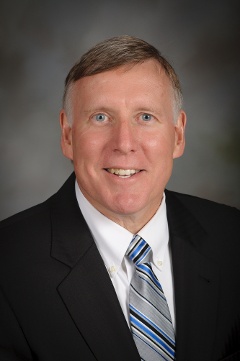Dean Richard Benson sole finalist for University of Texas at Dallas presidency

Richard C. Benson, the Paul and Dorothea Torgersen Chair of Engineering and dean of College of Engineering at Virginia Tech, is the sole finalist for the presidency of the University of Texas at Dallas.
The University of Texas Board of Regents voted to select Benson at a special board meeting held Monday. The decision followed an executive session where regents interviewed three candidates and considered recommendations of a presidential search advisory committee that reviewed nominations and applications for the position.
Under Texas state law, university governing boards must name finalists for a presidency at least 21 days before making an appointment. During that time, University of Texas System leaders will be coordinating meetings, giving stakeholders the opportunity to hear from Benson.
“My ten years at Virginia Tech have been exciting and rewarding. I am and will always be a true Hokie,” said Benson. “I am grateful to have had the opportunity to be both a faculty member and dean of engineering at a college that has an international reputation for excellence and has pioneered new ways to teach and to prepare our students to solve problems and contribute to the academic and societal issues of the day. To have had the cross-campus leadership and to have such a group of dedicated colleagues has made the College of Engineering a success and has prepared me for my next challenge.
"My wife Leslie and I are excited to have the chance to move to Dallas and for me to become president of a leading public institution and we will always be grateful and thankful for the time we shared together in Blacksburg.”
“Under Dick’s leadership, our College of Engineering has experienced record growth—doubling the number of student applicants and growing enrollment to close to 8,000 undergraduates and 2,300 graduate students, and the college is at its highest ever ranking in the National Science Foundation’s report on engineering schools’ research expenditures, with more than $200 million,” said Virginia Tech President Tim Sands. “The national and international reputation of Virginia Tech engineering has never been stronger because of all that he has accomplished.
"While we will greatly miss Dick’s leadership as our dean, UT Dallas has gained an energetic, dynamic leader whose vision and passion will guide that institution to great new heights. We wish him well in his new endeavor.”
“Dick’s wisdom and perspective have been deeply instrumental in advancing the college of engineering in a manner that also advanced Virginia Tech as a whole,” added Executive Vice President and Provost Thanassis Rikakis. “Finding someone to succeed him will be a great challenge. We will work quickly to identify an interim dean and consult with our colleagues in engineering for structuring a representative search committee so we can begin an international search for our next dean in early fall 2016. Because of the incredible work Dick has done building a world-class engineering college, I’m confident the very best candidates will seek out a position as prestigious as this is.”
Among the many highlights during his tenure at Virginia Tech, Benson encouraged his faculty to adopt a “Hands-On, Minds-On” philosophy of learning, producing engineering graduates that are considered among the most desirable by employers.
The College of Engineering climbed to its highest ever ranking in the National Science Foundation’s report on engineering schools’ research expenditures. The 2016 survey, reporting on figures for fiscal year 2014, shows the college at eighth place with $228.6 million in research expenditures.
In 2014, Benson presided over the opening of Goodwin Hall, a $100 million building that includes seven classrooms, an auditorium, and more than 40 instructional and research laboratories and offices for the mechanical engineering, aerospace and ocean engineering, engineering education, and chemical engineering departments, and the internationally celebrated Terrestrial Robotics Engineering and Controls (TREC) Lab.
Over the past decade, Virginia Tech engineering students routinely participated in many, and in several cases won, design competitions. For example, in 2011, the Hybrid Electric Vehicle Team of Virginia Tech won the North American EcoCAR Challenge, a three-year design competition that seeks to inspire science and engineering students to build more energy-efficient “green” automobiles.
In another international competition, Virginia Tech’s Robotics and Mechanisms Laboratory team dominated the 2011 humanoid robot soccer competition known as RoboCup, winning the Louis Vuitton Humanoid Cup, the competition’s version of the Fédération Internationale de Football Association’s World Cup. The team repeated its domination in 2012 in Mexico City, taking the top spot in Adult- and Kid-sized divisions.
Benson also helped facilitate the partnership between Wake Forest University with its premier medical facility and Virginia Tech faculty in the School of Biomedical Engineering and Sciences. The school offers master's and Ph.D. degrees. Its work has won international acclaim and scores of media headlines in a number of areas, most notably with its work into helmet research and head-injury prevention for football players at youth, college and professional levels.
Benson also championed the creation of the Institute for Critical Technology and Applied Science which is fast becoming a major, nationally prominent “home” for high-end, interdisciplinary research in the physical and engineering sciences.
Prior to coming to Virginia Tech, Benson was head of the Department of Mechanical Engineering at Pennsylvania State University beginning in 1995.He previously served as chair of the Department of Mechanical Engineering at the University of Rochester and prior to that was the associate dean for graduate studies in the university's College of Engineering and Applied Science.
The University of Texas at Dallas, located 20 miles north of Dallas, is one of the eight academic institutions of The University of Texas System. The university enrolls approximately 24,000 students in all—14,500 undergraduate and 9,500 graduate—and offers bachelor’s, master’s, and doctoral degree programs administered within the university’s eight academic schools.



